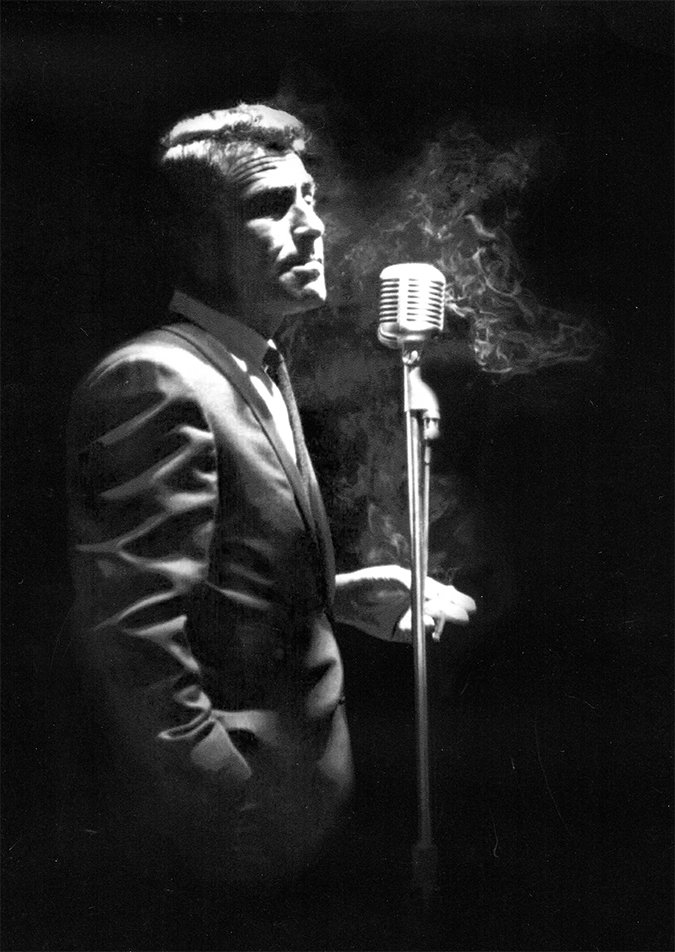The Creator: Rod Serling

Rodman Edward Serling (December 25, 1924 – June 28, 1975) was an American screenwriter, playwright, television producer, and narrator known for his live television dramas of the 1950s and his science-fiction anthology TV series, The Twilight Zone. Serling was active in politics, both on and off the screen, and helped form television industry standards. He was known as the "angry young man" of Hollywood, clashing with television executives and sponsors over a wide range of issues including censorship, racism, and war.
On October 2, 1959, the classic Twilight Zone series, created by Serling, premiered on CBS. For this series, Serling fought hard to get and maintain creative control. He hired scriptwriters he respected, such as Richard Matheson and Charles Beaumont. In an interview, Serling said the show's science fiction format would not be controversial with sponsors, network executives or the general public and would escape censorship, unlike the earlier script he'd written for Playhouse 90.
Serling drew on his own experience for many episodes, frequently about boxing, military life, and airplane pilots. The Twilight Zone incorporated his social views on racial relations, somewhat veiled in the science fiction and fantasy elements of the shows. Occasionally, the point was quite blunt, such as in the episode "I Am the Night— Color Me Black", in which racism and hatred causes a dark cloud to form in the American South and spread across the world. Many Twilight Zone stories reflected his views on gender roles, featuring quick-thinking, resilient women as well as shrewish, nagging wives.
The Twilight Zone aired for five seasons (the first three presented half-hour episodes, the fourth had hour-long episodes, and the fifth returned to the half-hour format). It won many TV and drama awards and drew critical acclaim for Serling and his co-workers. Though it had loyal fans, The Twilight Zone had only moderate ratings and was twice canceled and revived. After five years and 156 episodes (92 written by Serling), he grew weary of the series. In 1964, he decided not to oppose its third and final cancellation.
Serling sold the rights to The Twilight Zone to CBS. His wife later claimed he did this partly because he believed that his own production company, Cayuga Productions, would never recoup the production costs of the programs, which frequently went over budget.
"In an informal moment when you can buttonhole a network executive...He will say to you that indeed, no— It is not the responsibility of the networks to enlighten, educate...to lift the intellectual values or interests of a populace...Not at all...They are simply there to reflect what are the entertainment tastes of the masses."
The Twilight Zone eventually resurfaced in the form of a 1983 film by Warner Bros. Former Twilight Zone actor Burgess Meredith was cast as the film's narrator but does not appear on screen. There have been two attempts to revive the TV series with mostly new scripts. In 1985, CBS used Charles Aidman (and later Robin Ward) as the narrator. In 2002, UPN featured Forest Whitaker in the role of narrator. In 2019, CBS made a third attempt at a successful revival, with Jordan Peele taking on production duties as well as hosting and narration.
In 1969, NBC aired a television film pilot for a new series, Night Gallery, written by Serling. Set in a dimly lit museum after hours, the pilot film featured Serling (as on-camera host) playing the curator, who introduced three tales of the macabre, unveiling canvases that would appear in the subsequent story segments. Its brief first season (consisting of only six episodes) was rotated with three other shows airing in the same time slot; this wheel of shows was titled Four in One. The series generally focused more on horror and suspense than The Twilight Zone did. On the insistence of the producer, Jack Laird, Night Gallery also began including brief comedic "blackout" sketches during its second season, which Serling greatly disdained.
After The Twilight Zone was canceled, Serling wrote an unsuccessful western television series called The Loner, which ran from the fall of 1965 to April 1966. CBS asked Serling to have more action and less character interaction. He refused to comply, even though the show had received poor reviews and low ratings.

In a stylistic departure from his earlier work, Serling briefly hosted the first version of the game show Liar's Club in 1969.
No longer wanting the burden of an executive position, Serling sidestepped an offer to retain creative control of content, a decision he would come to regret. Although discontented with some of the scripts and creative choices of Jack Laird, Serling continued to submit his work and ultimately wrote over a third of the scripts for Night Gallery. By season three, however, many of his contributions were being rejected or heavily altered. Night Gallery was cancelled in 1973. NBC later combined episodes of the short-lived paranormal series The Sixth Sense with Night Gallery, in order to increase the number of episodes available in syndication. Serling was reportedly paid $100,000 to film introductions for these repackaged episodes.
Serling was said to smoke 3-4 packs of cigarettes a day. On May 3, 1975, he had a minor heart attack and was hospitalized. He spent two weeks at Tompkins County Community Hospital before being released. A second heart attack two weeks later forced doctors to agree that open-heart surgery, though considered risky at the time, was in order. The ten-hour-long procedure was performed on June 26, but Serling had a third heart attack on the operating table and died two days later at Strong Memorial Hospital in Rochester, New York. He was 50 years old. His funeral and burial took place on July 2 at Lake View Cemetery, Interlaken, Seneca County, New York. A memorial was held at Cornell University's Sage Chapel on July 7, 1975. Speakers at the Memorial included his daughter Anne and the Reverend John F. Hayward.
Throughout his career Serling was nominated for at least 12 awards for his work; 8 of which he won. He has also received at least 4 different honors from various organizations posthumously. The man is no more, but his stories (and their various forms) are alive and well, and continue to be enjoyed and beloved by people of all ages and the world over. His daughter Anne continues to look after his legacy. As did his wife Carol, who remained personally involved in overseeing the production of any continuation of her husband's work, (including the most recent one) up until her passing in January of 2020. Thanks to them, all the writings and media he left behind, and to his dedicated fans, Rod Serling will likely remain a beloved figure for many years to come.
